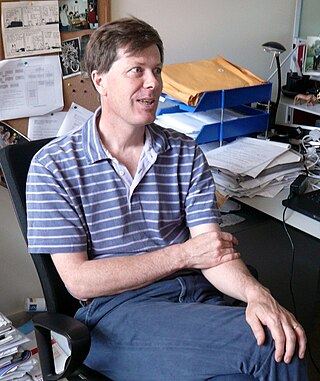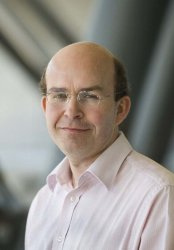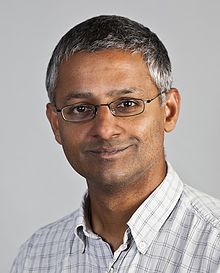
Walter Gilbert is an American biochemist, physicist, molecular biology pioneer, and Nobel laureate.

Frederick Sanger was a British biochemist who received the Nobel Prize in Chemistry twice.

Michael Smith was a British-born Canadian biochemist and businessman. He shared the 1993 Nobel Prize in Chemistry with Kary Mullis for his work in developing site-directed mutagenesis. Following a PhD in 1956 from the University of Manchester, he undertook postdoctoral research with Har Gobind Khorana at the British Columbia Research Council in Vancouver, British Columbia, Canada. Subsequently, Smith worked at the Fisheries Research Board of Canada Laboratory in Vancouver before being appointed a professor of biochemistry in the UBC Faculty of Medicine in 1966. Smith's career included roles as the founding director of the UBC Biotechnology Laboratory and the founding scientific leader of the Protein Engineering Network of Centres of Excellence (PENCE). In 1996 he was named Peter Wall Distinguished Professor of Biotechnology. Subsequently, he became the founding director of the Genome Sequencing Centre at the BC Cancer Research Centre.

Sir John Edward Sulston was a British biologist and academic who won the Nobel Prize in Physiology or Medicine for his work on the cell lineage and genome of the worm Caenorhabditis elegans in 2002 with his colleagues Sydney Brenner and Robert Horvitz at the MRC Laboratory of Molecular Biology. He was a leader in human genome research and Chair of the Institute for Science, Ethics and Innovation at the University of Manchester. Sulston was in favour of science in the public interest, such as free public access of scientific information and against the patenting of genes and the privatisation of genetic technologies.

Sir Gregory Paul Winter is a Nobel Prize-winning English molecular biologist best known for his work on the therapeutic use of monoclonal antibodies. His research career has been based almost entirely at the MRC Laboratory of Molecular Biology and the MRC Centre for Protein Engineering, in Cambridge, England.

The Wellcome Sanger Institute, previously known as The Sanger Centre and Wellcome Trust Sanger Institute, is a non-profit British genomics and genetics research institute, primarily funded by the Wellcome Trust.

In molecular biology, G-quadruplex secondary structures (G4) are formed in nucleic acids by sequences that are rich in guanine. They are helical in shape and contain guanine tetrads that can form from one, two or four strands. The unimolecular forms often occur naturally near the ends of the chromosomes, better known as the telomeric regions, and in transcriptional regulatory regions of multiple genes, both in microbes and across vertebrates including oncogenes in humans. Four guanine bases can associate through Hoogsteen hydrogen bonding to form a square planar structure called a guanine tetrad, and two or more guanine tetrads can stack on top of each other to form a G-quadruplex.

John Frederick William Birney is joint director of EMBL's European Bioinformatics Institute (EMBL-EBI), in Hinxton, Cambridgeshire and deputy director general of the European Molecular Biology Laboratory (EMBL). He also serves as non-executive director of Genomics England, chair of the Global Alliance for Genomics and Health (GA4GH) and honorary professor of bioinformatics at the University of Cambridge. Birney has made significant contributions to genomics, through his development of innovative bioinformatics and computational biology tools. He previously served as an associate faculty member at the Wellcome Trust Sanger Institute.

Steven Lloyd Salzberg is an American computational biologist and computer scientist who is a Bloomberg Distinguished Professor of Biomedical Engineering, Computer Science, and Biostatistics at Johns Hopkins University, where he is also Director of the Center for Computational Biology.

Douglas Bruce Kell is a British biochemist and Research Professor of Systems Biology in the Institute of Systems, Molecular and Integrative Biology at the University of Liverpool, and a Co-founder of Epoch Biodesign Ltd. He was previously at the School of Chemistry at the University of Manchester, based in the Manchester Institute of Biotechnology (MIB). He founded and led the Manchester Centre for Integrative Systems Biology. He served as chief executive officer (CEO) of the Biotechnology and Biological Sciences Research Council (BBSRC) from 2008 to 2013.

Richard Michael Durbin is a British computational biologist and Al-Kindi Professor of Genetics at the University of Cambridge. He also serves as an associate faculty member at the Wellcome Sanger Institute where he was previously a senior group leader.

Timothy John Phillip Hubbard is a Professor of Bioinformatics at King's College London, Head of Genome Analysis at Genomics England and Honorary Faculty at the Wellcome Trust Sanger Institute in Cambridge, UK. From 1 March 2024, Hubbard became the director of Europe's Life Science Data Infrastructure ELIXIR.
Michael Webster Bevan is a professor at the John Innes Centre, Norwich, UK.

Julian Parkhill is Professor of Bacterial Evolution in the Department of Veterinary Medicine at the University of Cambridge. He previously served as head of pathogen genomics at the Wellcome Sanger Institute.

Sarah Amalia Teichmann is a German scientist who is head of cellular genetics at the Wellcome Sanger Institute and a visiting research group leader at the European Bioinformatics Institute (EMBL-EBI). She serves as director of research in the Cavendish Laboratory, at the University of Cambridge and a senior research fellow at Churchill College, Cambridge.
Sir David Klenerman is a British biophysical chemist and a professor of biophysical chemistry at the Department of Chemistry at the University of Cambridge and a Fellow of Christ's College, Cambridge.
Tom Brown FRSC FRSE is a British chemist, biotechnologist, and entrepreneur. He is the Professor of Nucleic acid chemistry at the Department of Chemistry and Department of Oncology at the University of Oxford. Currently, he is serving as the President of the Chemical Biology Interface Division of the Royal Society of Chemistry. He is best known for his contribution in the field of DNA Repair, DNA Click chemistry, and in the application of Molecular genetics in forensics and diagnostics.

Nigel Shaun Scrutton is a British biochemist and biotechnology innovator known for his work on enzyme catalysis, biophysics and synthetic biology. He is Director of the UK Future Biomanufacturing Research Hub, Director of the Fine and Speciality Chemicals Synthetic Biology Research Centre (SYNBIOCHEM), and Co-founder, Director and Chief Scientific Officer of the 'fuels-from-biology' company C3 Biotechnologies Ltd. He is Professor of Enzymology and Biophysical Chemistry in the Department of Chemistry at the University of Manchester. He is former Director of the Manchester Institute of Biotechnology (MIB).
Shantanu Chowdhury is an Indian structural biologist and a professor at Institute of Genomics and Integrative Biology of the Council of Scientific and Industrial Research. He is known for developing a mechanism for gene regulation mediated by DNA Secondary-Structure in diverse cellular contexts. An elected fellow of the National Academy of Sciences, India, he is a recipient of the National Bioscience Award for Career Development of the Department of Biotechnology in 2010. The Council of Scientific and Industrial Research, the apex agency of the Government of India for scientific research, awarded him the Shanti Swarup Bhatnagar Prize for Science and Technology, one of the highest Indian science awards, in 2012, for his contributions to biological sciences.
Professor Stephen Neidle is a British X-ray crystallographer, chemist and drug designer working at the UCL School of Pharmacy. His area of scientific research has been in nucleic acid structure and recognition, and the research topic of quadruplexes.















